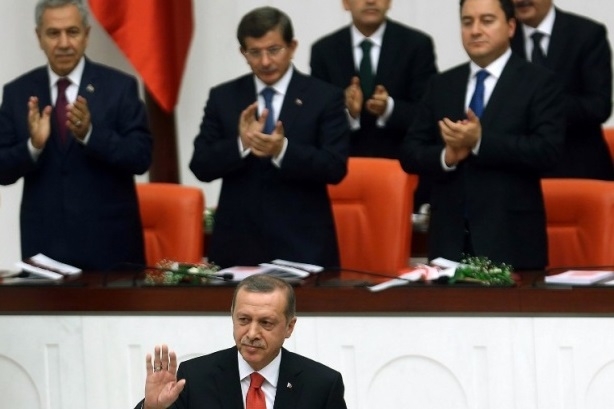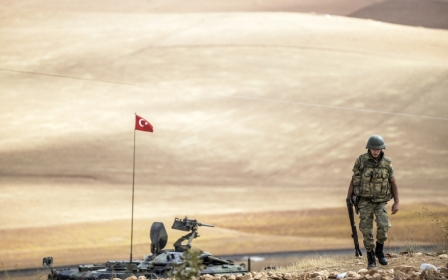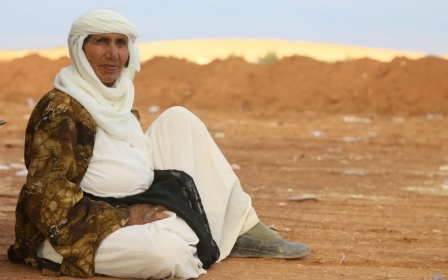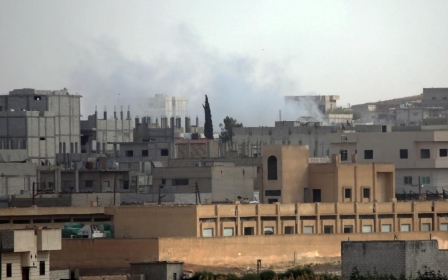Turkey parliament votes on troop deployment in Iraq, Syria

The Turkish government is discussing Thursday an inclusive motion submitted to parliament on 30 September which aims to expand authorisation to act against recent security threats from Iraq and Syria.
The request seeks permission from parliament for the presence and transit of foreign soldiers in Turkish territory and the deployment of Turkish military forces to Iraq and Syria, sources from Turkey’s central command told Hurriyet .
The session on Thursday was originally aimed to extend the term of already existing motions on Iraq and Syria that were set to expire on 4 and 17 October respectively. The permits were first approved in October 2012 after the uprising in Syria turned into a civil war with sporadic cross-border fire exchange between the two countries, but they never materialised into overt Turkish military action in Syria.
Turkish troops are currently authorised by the parliament to operate across the Iraq border to defend Turkey against the outlawed Kurdistan Workers’ Party, or PKK.
Turkey’s parliament will be wrangling to strike a balance between a plethora of domestic and regional considerations regarding the extent of its involvement in the anti-IS coalition.
Cengiz Candar, from the Turkish liberal daily Radikal, wrote that Ankara finds itself trapped between a number of options that are hard to reconcile.
“[To safeguard its security, Turkey is contemplating] taking a more active part in the anti-IS coalition so as not to jeopardise its relations with Washington further, not to rock the boat with the Kurds and spell the end of the ‘peace process’ in Turkey, and to remain consistent with its avowed objective of removing the Damascus regime,” he wrote in Al-Monitor.
The Kurdish issue presents a particularly tricky hurdle for Turkish parliamentarians to overcome, analysts say.
“Turkey is following a peace process regarding the Kurds, but at the same time, it is trying to disarm the PKK. The current situation in the region creates a fertile ground for the PKK to become more active. This is not something that Turkey wants,” said Burhanettin Duran, professor of political science at Istanbul Sehir University and member of the Turkey-based think tank SETA.
While Turkey’s cabinet members realise the extent of the IS threat towards Turkey, there remain obstacles in the way of their support for a full-blown contribution towards the militant group’s eradication.
“Turkey does not want to be part of the chaos in Iraq and Syria and it does not want to be in a combatting position against any actors in the region,” Duran told MEE.
“If Turkey were to take an aggressive policy towards Iraq and Syria, that could create domestic problems for the country,” he added.
Turkish officials have been cautious about joining the coalition. While President Recep Tayyip Erdogan gave indications during a trip to New York for the UN General Assembly last week that the country was inching towards joining the coalition, new Prime Minister Ahmet Davutoglu released a statement denying that Incirlik Base in southern Turkey had been used for strikes in Syria.
Even after the hostages arrived home on 20 September, analysts highlighted that Turkey might still be hemmed in by a burgeoning Islamic State threat within the country, used as a recruiting ground for the group and a pathway for its fighters headed to Syria and Iraq.
Most signs, however, indicate that parliamentarians will pass Thursday's motion. With the threats posed to the country's internal security and the repercussions on its regional and international standing, Turkey's attempts to strike a delicate balance may no longer be possible and there is a growing sense of urgency in some corners.
“If not prevented, sooner or later the IS will target Turkey and this is why we should take some risks,” Halil Kaplan, a columnist at Turkish daily, Yeni Safak, told MEE last week.
Duran agrees: “Syria and Iraq are Turkey’s neighbours; we don’t know if the coalition will be successful or not. In the case of any scenario, the repercussions will affect Turkey and it has to be ready for any situation."
Duran explained that IS presents Turkey with many challenges: the influx of thousands of refugees fleeing to Turkey; foreign fighters threatening domestic security as they pass through Turkey to fight in Syria; and in the case of an IS victory, a partitioning of Syria and Iraq could lead to the massacring of Sunnis, Shiites and Kurds.
Turkish official have already made clear statements indicating a potential boots on the ground involvement.
Turkey’s chief of staff addressed on Thursday the Turkish troops stationed near Suleyman Shah Tomb, a Turkish enclave in Syria which has been susceptible to IS attacks, saying: “With a single shout out from you, you will find the Turkish army at your side,” reported the Anadolu Agency.
While parliament may indeed authorise the motion, some analysts believe it is unlikely that Turkey will actually deploy troops on the ground or allow foreign troops to transit - and that the vote is a rhetorical exercise.
“Turkey will authorise the motion, but that doesn’t mean it will send troops or allow foreign troops to go through. Turkey is preparing itself for any sudden developments and needs to be ready for any surprises,” Duran told MEE.
Before Turkey puts troops on the ground, officials have identified preconditions for the coalition, namely establishing buffer zones in northern Syria and creating a no-fly zone.
“Turkey is not in the position to start an overseas bombing campaign. This is why it insists on establishing ‘safe zones’. Since we cannot reduce the risk by not doing anything, Turkey should shape out the anti-IS campaign for its own needs,” Kaplan told MEE contributor Cagri Ozdemir.
The Erdogan administration has called for a more comprehensive strategy to weaken the Assad government as part of the coalition’s objectives.
President Bashar al-Assad’s forces in Syria are "not less dangerous" than the Islamic State militants, Turkish Foreign Minister Mevlut Cavusoglu said.
“Turkey wants to empower the Free Syrian Army and other moderate Syrian actors. We do not want the Assad regime to consolidate its power after IS,” said Duran.
Turkey has seen a massive influx of Kurdish refugees from Kobane, or Ain al-Arab (as it is known in Arabic), since IS militants besieged the Syrian border town, drawing more than 160,000 refugees to seek shelter in Turkey.
New MEE newsletter: Jerusalem Dispatch
Sign up to get the latest insights and analysis on Israel-Palestine, alongside Turkey Unpacked and other MEE newsletters
Middle East Eye delivers independent and unrivalled coverage and analysis of the Middle East, North Africa and beyond. To learn more about republishing this content and the associated fees, please fill out this form. More about MEE can be found here.




